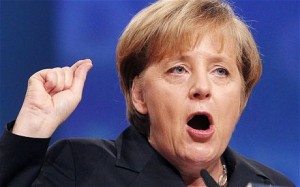Like Sweden and Denmark, Germany is a semi-rational welfare state. It generally relies on a market-oriented approach in areas other than fiscal policy, and it avoided the Keynesian excesses that caused additional misery and red ink in America (though it is far from fiscally conservative, notwithstanding the sophomoric analysis of the Washington Post).
Nonetheless, it’s difficult to have much optimism for Europe’s future when the entire political establishment of Germany blindly thinks there should be more centralization, bureaucratization, and harmonization in Europe.
The EU Observer has a story about the agenda of the de facto statists in the Christian Democratic party who currently run Germany.
…what Merkel and her party are piecing together is a radical vision of the EU in a few years time – a deep fiscal and political union. The fiscal side involves tax harmonisation, a tightly policed Stability and Growth Pact with automatic sanctions for countries that breach debt and deficit rules, and the possibility of an EU Commissioner responsible for directly intervention to oversee budgetary policy in a crisis-hit country. …On the institutional side, the CDU backs a directly elected President of the European Commission as well as clearly establishing the European Parliament and Council of Ministers as a bi-cameral legislature with equal rights to initiate EU legislation with the Commission.
Keep in mind that the Christian Democrats are the main right-of-center party in Germany, yet the German political spectrum is so tilted to the left that they want tax harmonization (a spectacularly bad idea) and more centralization.
Heck, even the supposedly libertarian-oriented Free Democratic Party is hopelessly clueless on these issues.
Not surprisingly, the de jure statists of Germany have the same basic agenda. Here’s some of what the article says about the agenda of the Social Democrat and Green parties.
…its commitments to establish joint liability eurobonds and a “common European fiscal policy to ensure fair, efficient and lasting receipts” would also involve a shift of economic powers to Brussels. While both sides have differing ideological positions on the political response to the eurozone crisis – they are talking about more Europe, not less.
The notion of eurobonds is particularly noteworthy since it would involve putting German taxpayers at risk for the reckless fiscal policies in nations such as Greece, Italy, and Spain. That’s only a good idea if you think it’s smart to co-sign a loan for your unemployed and alcoholic cousin with a gambling addiction.
All this makes me feel sorry for German taxpayers.
Then again, if you look at the long-run fiscal outlook of the United States, I feel even more sorry for American taxpayers. Thanks to misguided entitlement programs, we’re in even deeper trouble than Europe’s welfare states.

